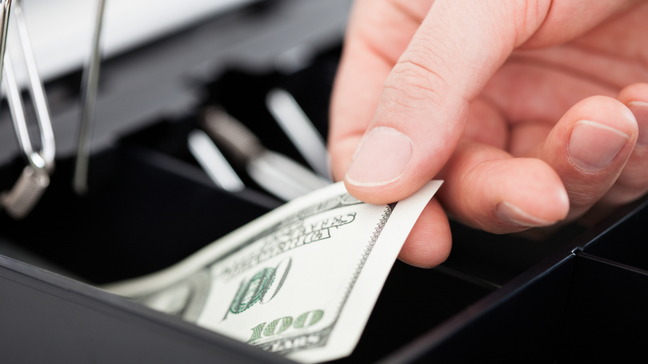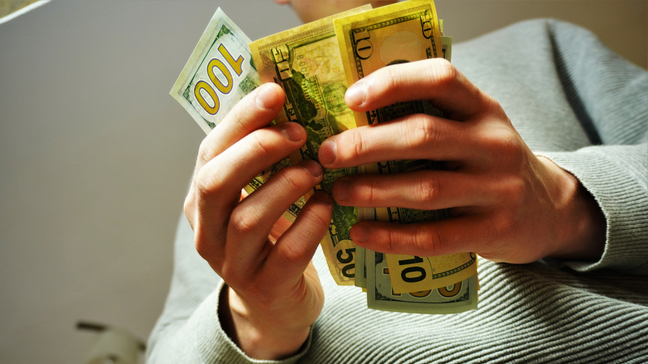Check-cashing services are a convenient, and often instant way that people without access to a bank account can cash a check. For some, it is the only way that they can access the money they worked so hard to get.
But what if I told you that they have the power to trap you in a cycle of paying high service fees and remaining unbanked?
Would you still want to use them?
Keep reading to find out exactly how a check-cashing service works and what alternatives might be better for you.
How to cash a check with a check-cashing service

Cashing a check through a check-cashing service is very simple.
Generally, you should follow these steps:
1. Receive a check
There are several reasons why you might need to cash a check with a check-cashing service. If you receive a paycheck, a check from the government, or a personal check from a friend (or acquaintance), a check-cashing service can help you to exchange the check for cash.
Once you have a check in hand, it is time to take the next step.
2. Visit a check-cashing service
The next step is to grab your check and visit a check-cashing service location. They tend to be located in areas that may be underserved by traditional banks.
Sometimes, you will find one located inside of major retailers, like Walmart. Some check-cashing services are even open 24/7, making them an accessible alternative for people who work long hours or who need cash fast.
Some common check-cashing companies include:
- The Check-Cashing Store.
- ACE Cash Express.
- Check Into Cash.
- The Money Mart.
A simple Google search will help you to find a check-cashing service near you.
3. Cash your check
When you visit a check-cashing service, you’ll hand your check over to the employee at the store, and they’ll exchange it for cash. This process typically only takes a few minutes.
Check-cashing services typically charge a percentage-based fee, ranging from around 2% to 10% of the value of the check.
Most check-cashing services also have a minimum fee of at least $3.
You may be offered a prepaid card instead
In some cases, a check-cashing service may also offer customers the choice between a prepaid card and paper money.
Prepaid cards are similar to gift cards, in that money is stored on the card, which you can then use to make purchases at retailers and online. However, prepaid cards may also come with transaction fees, monthly fees, and ATM fees depending on the card.
4. Consider alternatives in the future
While check-cashing services are convenient, they often charge higher fees than other alternatives. In the future, you should consider opening a bank account or cashing your check using another less expensive method (more on this below).
Why do people turn to check-cashing services?
There are a variety of reasons why someone might want to use a check-cashing service, including not having access to a bank account or needing cash immediately.
They can’t open a bank account
Some people use check-cashing services because they’re unable to open a regular bank account. This could be for a variety of reasons:
- They have a poor ChexSystems score.
- They don’t have enough savings to meet minimum deposit requirements.
- There’s not a bank in their area.
For these customers, check-cashing services might be a last resort.
They don’t have access to a bank
Just because someone has a bank account, it doesn’t mean that they have a physical branch near where they live. For those people, an online break is usually the solution.
But what if you don’t have access to a secure internet connection?
That changes the game.
These customers may use check-cashing services because they’re more conveniently located. While many banks now make it possible to deposit checks using mobile deposit, some people still prefer to deposit checks in person.
They need immediate access to cash
In many cases, check-cashing services provide immediate access to cash. In contrast, when depositing a check at a bank, it may take one or more business days for the funds to clear.
This makes check-cashing services an attractive option for customers who need immediate access to cash.
Because check-cashing services are also often open 24 hours a day, they can be more convenient than banks for those with untraditional work hours.
They don’t want to participate in the traditional banking system
Some people have good reasons for not wanting to participate in the traditional banking system, whether they’ve suffered from unfair fees and extra charges in the past, or just want to maintain independence and anonymity (hey, I get it).
That said, not having a bank account and relying solely on cash can cause more problems than it solves.
Pros and cons of using check-cashing services

Pros of check-cashing services:
- Available to the unbanked and underbanked. You can still use a check-cashing service if you don’t have a bank account. Check-cashing services are also often more conveniently located than physical bank branches.
- Immediate access to cash. If you need to have cash on hand immediately, using a check-cashing service will usually take less time than depositing a check at a bank.
Cons of check-cashing services:
- High fees. Check-cashing services charge much higher fees than banks. While the fees vary depending on the service provider, you can expect to pay anywhere from $4 to $45.
- Can perpetuate a cycle. While check-cashing services make it easier for unbanked customers to have quick access to cash, they also make it easier to get stuck outside of the traditional banking system, relying solely on cash and unable to take advantage of financial products like checking accounts, savings accounts, or loans.
- Safety issues. If you use a check-cashing service to deposit your whole paycheck, you may be left carrying around a lot of cash. This can be a safety concern, and you run the risk of having your hard-earned money stolen, lost, or damaged.
Alternatives to check-cashing services
Check-cashing services just aren’t a good deal. They charge extremely high fees and don’t make it any easier for customers to access traditional banking services.
This means that it can be even more difficult for these customers to access any service or financial product that requires a bank account to use, from stimulus checks to loans and everything in between.
Luckily, there are the following alternatives to check-cashing services.
Open a bank account with a mobile deposit option
While it used to be necessary to visit a physical bank branch in order to deposit a check, that’s no longer the case. Instead, all you have to do is snap a picture of the check using your mobile banking app and the money will be deposited straight to your account.
Popular online financial apps like Ally are great options if you’re interested in depositing checks using mobile deposit.
They charge low fees and have no minimum balance requirements, making them accessible even to borrowers who find themselves shut out of pricier traditional banks.*
Open a second chance checking account
If you write a bad check or overdraw your account one too many times, you may find it difficult to open a new bank account. Banks use a system called ChexSystem to determine whether or not to allow you to open an account, which is sort of like a credit score, but just for banking. If your score is too low, banks will be reluctant to let you do business with them.
Luckily, several banks offer a type of bank account known as a second chance checking account. These accounts are available even to customers with poor ChexSystem scores. Banks that offer second chance checking or don’t use ChexSystem include Radius and Varo.
Sign up for direct deposit
If you’re paid by check at work and use a check-cashing service to cash it, there could be a better option.
Many workplaces allow employees to sign up for direct deposit, which eliminates the need to cash a paper check.
If you already have a bank account, but still use a check-cashing service to cash paper checks because it’s more convenient, signing up for direct deposit is a simple way to eliminate this extra step.
Cash a check at the issuing bank
Even if you don’t have a bank account with the bank, many banks will still cash a check for you if the check has been issued by the same bank. This can save you the high fees often charged by check-cashing services.
Cash a check at a chain retailer
Some chain retailers, like Walmart, also offer check-cashing services. While these retailers do still charge high fees to cash a check, they’re often a more affordable option than independently-operated check-cashing services.
While they can cash payroll checks, government checks, and money orders, they’re usually not able to cash personal checks.
Endorse the check to a friend or family member
If you have a friend or family member with access to a bank account, you could endorse your check to them. This means that you sign the check over to them, and they can then deposit it in their own account and withdraw cash to give to you.
Not all banks accept endorsed checks, so you should make sure to check the bank’s policy beforehand.
You should also only endorse a check for a friend or family member that you trust to be responsible with your money and pay you back.
Summary
Relying on check-cashing services is okay in a pinch, but regularly using them could trap you in a cycle. Remaining unbanked or underbanked could also shut you out of valuable financial products and opportunities like checking accounts, savings accounts, loans, credit cards, and more.
With so many alternatives to check-cashing systems available, it’s a good idea to avoid the high fees and choose a less expensive option.